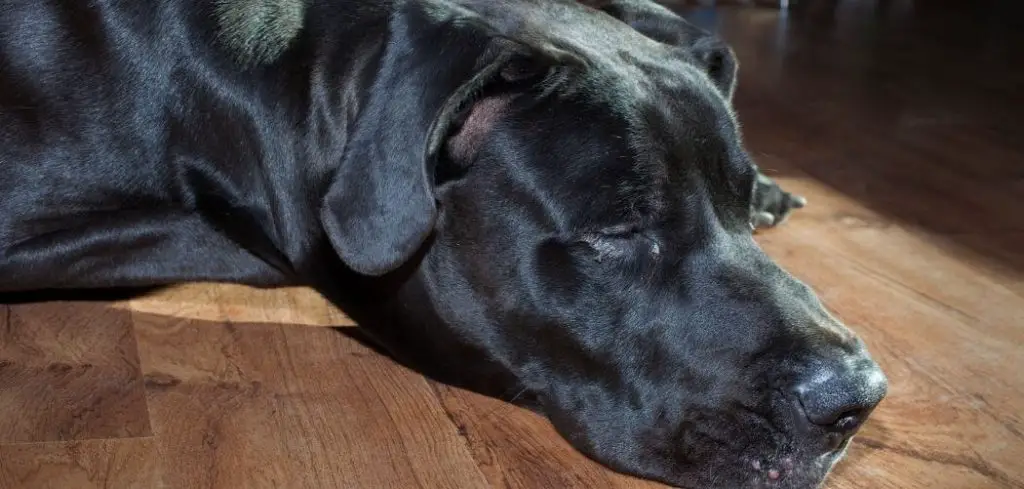If your dog has diarrhea with mucus for a week, it can be alarming and concerning. Persistent digestive issues often signal something more serious than a simple upset stomach and require careful attention.
We outline the common causes of a dog having diarrhea with mucus for a week, what you can do at home, and when to seek veterinary help.
Dog Has Diarrhea with Mucus for a Week — Why It Happens
When a dog has diarrhea with mucus for a week, it usually points to ongoing irritation or inflammation in the digestive tract. Mucus is produced by the intestines to protect the gut lining, and when it appears in stool consistently, it often suggests infection, parasites, chronic inflammation, or dietary sensitivities.
Conditions such as inflammatory bowel disease, colitis, or even prolonged exposure to unsuitable foods can all trigger these symptoms. In some cases, it may also be linked to bacterial imbalances or more serious systemic illnesses.

Dog Has Diarrhea with Mucus for a Week: Common Causes
Colitis
Colitis refers to inflammation of the large intestine, which commonly produces mucus in stool.
When colitis persists for a week or longer, it can lead to watery stools coated with slimy mucus, often accompanied by straining.
Stress, food intolerances, or infections can all cause colitis. For dogs with chronic colitis, the diarrhea may wax and wane, but mucus tends to remain a consistent sign.
Read more: Dog Diarrhea with Blood and Mucus (What it really means)
Parasitic Infections
Parasites such as giardia, whipworms, and coccidia often lead to prolonged diarrhea with mucus.
These organisms irritate the intestinal lining and prevent proper absorption of nutrients.
Owners may notice that the diarrhea continues beyond just a day or two, sometimes worsening over a week, and dogs may lose weight or develop a dull coat.
Even if your dog seems energetic, the presence of parasites can have long-term consequences if not treated.
Inflammatory Bowel Disease (IBD)
IBD is a chronic condition where the immune system mistakenly attacks the digestive tract. This leads to ongoing inflammation, diarrhea with mucus, and sometimes blood.
Unlike simple stomach upsets, IBD doesn’t improve on its own and often persists for weeks or months.
A dog with IBD may have periods of normal stools followed by flare-ups, which explains why mucus-filled diarrhea can last a week or longer.
Dietary Intolerance or Food Allergies
Dogs that develop sensitivities to certain proteins, grains, or additives may have persistent loose stools with mucus.
Unlike a single incident of dietary indiscretion, food-related diarrhea tends to be long-lasting, often continuing as long as the dog is exposed to the problematic ingredient.
Common culprits include chicken, beef, dairy, or wheat. Switching diets under veterinary guidance often helps identify and manage these issues.
Bacterial Overgrowth or Imbalance
Sometimes, diarrhea with mucus is caused by an overgrowth of harmful bacteria in the intestines.
This can occur after antibiotic use, which disrupts the balance of good and bad bacteria. Prolonged diarrhea in such cases is often foul-smelling and may contain both mucus and occasional blood.
Dogs with bacterial imbalances may also show decreased appetite or mild lethargy.
More Serious Conditions
Although less common, persistent diarrhea with mucus can be a sign of more severe problems such as intestinal tumors, polyps, or systemic diseases affecting digestion.
These conditions are more likely in older dogs or those with additional symptoms such as weight loss, vomiting, or anemia. A week of diarrhea with mucus is long enough to justify ruling out these possibilities with your vet.
What to Do If Your Dog Has Diarrhea with Mucus for a Week
If your dog has had diarrhea with mucus for a week, supportive care at home can help while you arrange veterinary evaluation.
Ensure your dog has access to plenty of fresh water, as prolonged diarrhea quickly leads to dehydration.
You can also offer a bland diet, such as plain boiled chicken and rice, to ease digestion and give the gut a chance to rest.
Adding probiotics recommended by your vet can help restore healthy gut bacteria, especially if the diarrhea was triggered by antibiotics or dietary changes.
Be consistent with small, frequent meals rather than large portions, as this is gentler on the intestines. Avoid giving your dog treats, table scraps, or new foods during this time, as these can worsen symptoms.
If your dog appears otherwise bright and active, these steps may provide relief, but persistent symptoms lasting a full week always require veterinary input.
When to Call or Visit Your Vet
Diarrhea lasting more than a few days—especially with mucus—warrants veterinary attention.
If your dog’s condition has continued for a week, it’s time to make an appointment, even if they still seem energetic. Chronic diarrhea can cause nutrient deficiencies and dehydration that aren’t always obvious at first.
Seek urgent veterinary care if you notice blood in the stool, vomiting, severe lethargy, or refusal to eat and drink. These signs may indicate something more serious than simple colitis or intolerance.
Puppies, senior dogs, and those with pre-existing health problems are especially vulnerable to complications from prolonged diarrhea, so they should be seen sooner rather than later.
Your vet may recommend stool testing, blood work, or dietary trials to determine the cause and provide appropriate treatment. In many cases, with proper diagnosis and care, dogs recover well and return to normal digestive health.
Read more: Runny Dog Poop with Blood and Mucus (When to worry and act fast)
Key Takeaway
If your dog has diarrhea with mucus for a week, it’s more than just a minor stomach upset. Ongoing mucus production in the stool signals irritation, inflammation, or infection that needs attention.
While supportive care at home may help in the short term, persistent symptoms should always be evaluated by a vet.
Early diagnosis and treatment can prevent complications, keep your dog comfortable, and restore their digestive balance. Trust your instincts—if the problem has lasted a week, don’t wait longer to get professional help.
